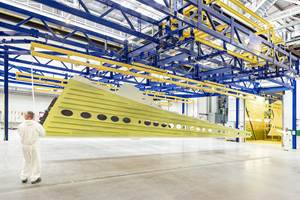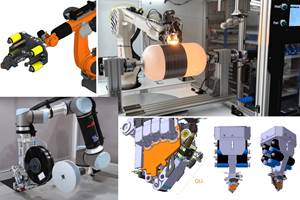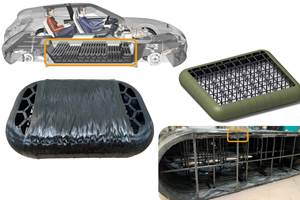Automated towpreg systems provides direct access to wet winding
CAMX 2024: Century Design Inc. highlights its OnDemand towpreg systems, designed to provide differentiation and cost efficiency in-house while maintaining high quality.
Share
Century Design Inc. (CDI, San Diego, Calif., U.S.) presents its OnDemand towpreg system, a solution for wet winding that is designed to eliminate high costs and supply chain instability.
CDI’s OnDemand towpreg system delivers a comprehensive solution by granting manufacturers direct access to “affordable” high-quality towpreg materials. With full control over material type and properties, this system enables users to bypass traditional suppliers for more consistent material procurement.
The OnDemand towpreg line features a fully automated process, only requiring a single, entry-level operator. Its compact setup, housed within a 10' × 4' footprint, can integrate seamlessly into the customer’s production environmentt, making it ideal for point-of-use application. The automated system also produces finished towpreg materials tailored to users’ specifications for immediate usability for composite part fabrication.
According to the company, one of the standout benefits of this towpreg line is its versatility — it is compatible with a wide range of industry-standard fibers and resins. Manufacturers can select from an array of customer-formulated or off-the-shelf resin systems to meet specific application needs.
“With the OnDemand material lines for parts makers, we’ve addressed the industry’s need for differentiation and cost efficiency,” says CDI’s lead engineer. “Our technology provides manufacturers with high-quality, customizable products while significantly lowering overall production costs.”
Bringing material production in-house can offer substantial benefits for wet winders. By eliminating the need for external suppliers, manufacturers have the ability to gain full control over production schedules, which further enhances efficiency and reduces lead times. This capability also facilitate rapid optimization of material properties and configuration to best suit downstream processing needs.
The modular design of CDI’s towpreg system is engineered to support not only R&D and small-scale production, but also scaling for high-volume production.
Related Content
-
Carbon fiber, bionic design achieve peak performance in race-ready production vehicle
Porsche worked with Action Composites to design and manufacture an innovative carbon fiber safety cage option to lightweight one of its series race vehicles, built in a one-shot compression molding process.
-
Plant tour: Spirit AeroSystems, Belfast, Northern Ireland, U.K.
Purpose-built facility employs resin transfer infusion (RTI) and assembly technology to manufacture today’s composite A220 wings, and prepares for future new programs and production ramp-ups.
-
The next evolution in AFP
Automated fiber placement develops into more compact, flexible, modular and digitized systems with multi-material and process capabilities.
Related Content
Carbon fiber, bionic design achieve peak performance in race-ready production vehicle
Porsche worked with Action Composites to design and manufacture an innovative carbon fiber safety cage option to lightweight one of its series race vehicles, built in a one-shot compression molding process.
Read MorePlant tour: Spirit AeroSystems, Belfast, Northern Ireland, U.K.
Purpose-built facility employs resin transfer infusion (RTI) and assembly technology to manufacture today’s composite A220 wings, and prepares for future new programs and production ramp-ups.
Read MoreThe next evolution in AFP
Automated fiber placement develops into more compact, flexible, modular and digitized systems with multi-material and process capabilities.
Read MoreTU Munich develops cuboidal conformable tanks using carbon fiber composites for increased hydrogen storage
Flat tank enabling standard platform for BEV and FCEV uses thermoplastic and thermoset composites, overwrapped skeleton design in pursuit of 25% more H2 storage.
Read MoreRead Next
All-recycled, needle-punched nonwoven CFRP slashes carbon footprint of Formula 2 seat
Dallara and Tenowo collaborate to produce a race-ready Formula 2 seat using recycled carbon fiber, reducing CO2 emissions by 97.5% compared to virgin materials.
Read MorePlant tour: Daher Shap’in TechCenter and composites production plant, Saint-Aignan-de-Grandlieu, France
Co-located R&D and production advance OOA thermosets, thermoplastics, welding, recycling and digital technologies for faster processing and certification of lighter, more sustainable composites.
Read MoreVIDEO: High-volume processing for fiberglass components
Cannon Ergos, a company specializing in high-ton presses and equipment for composites fabrication and plastics processing, displayed automotive and industrial components at CAMX 2024.
Read More













